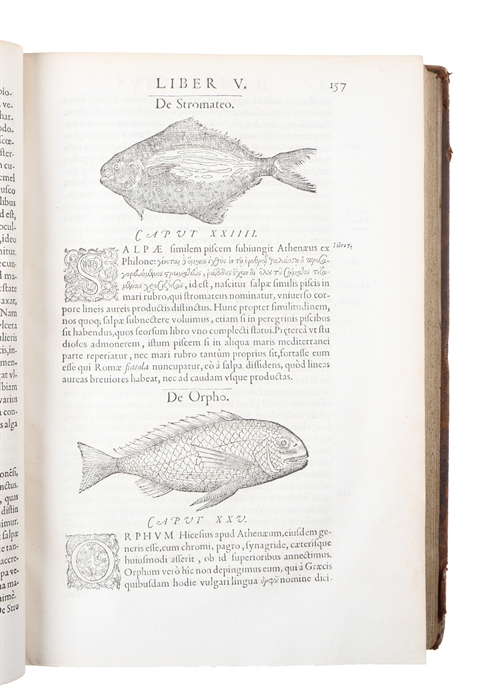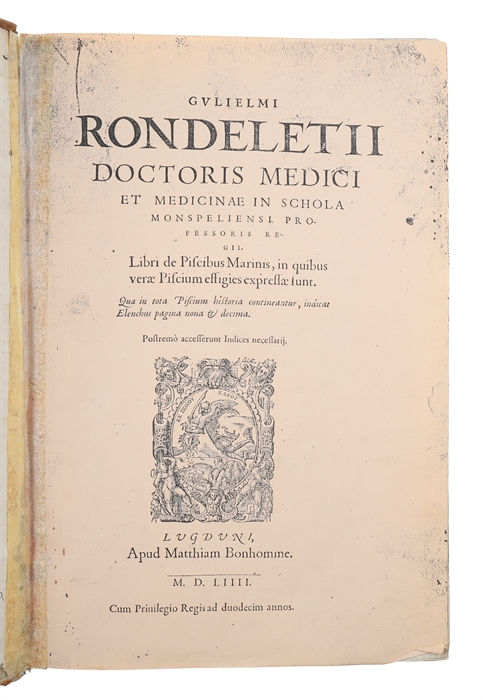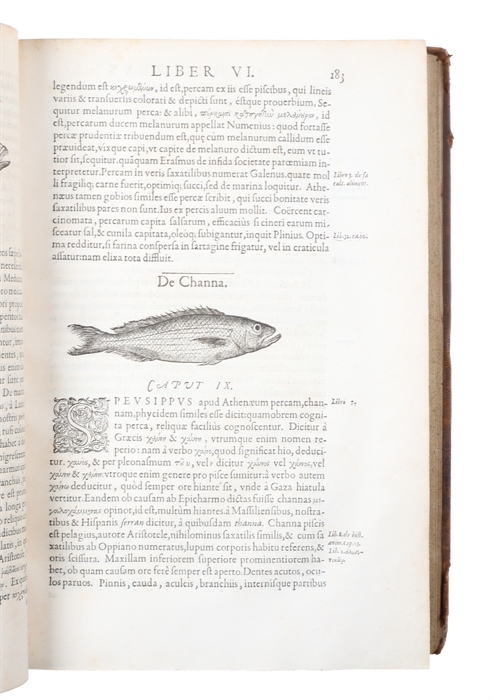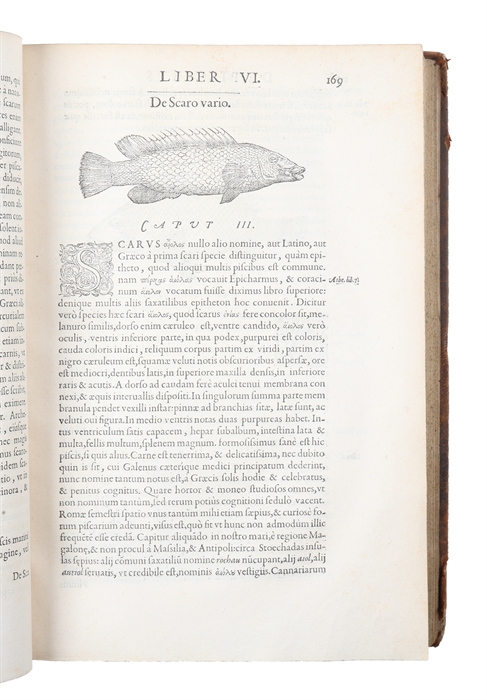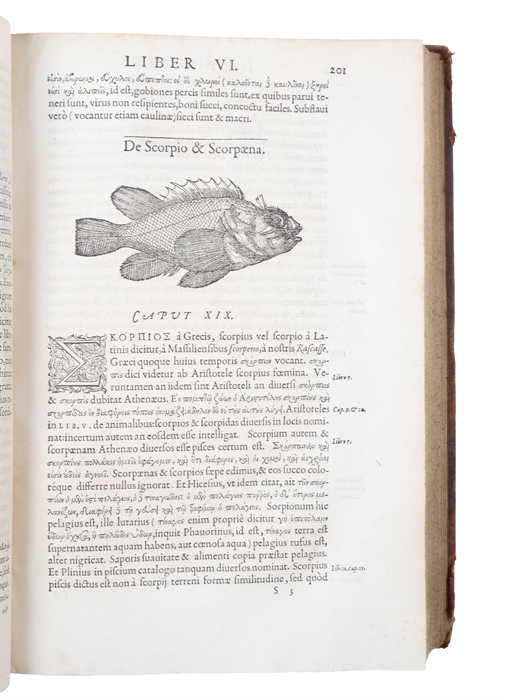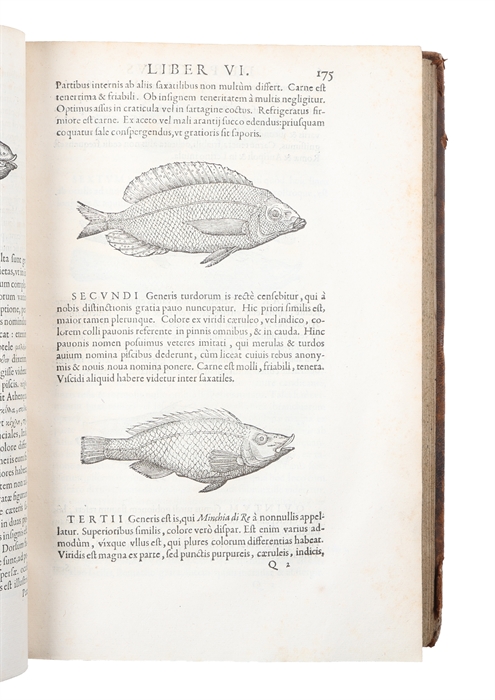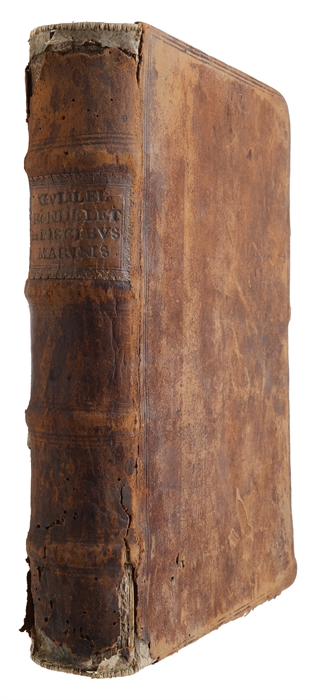THE FOUNDATION OF SCIENTIFIC ICHTHYOLOGY
RONDELETUS, GULIELMUS (GUILLAUME RONDELET).
Libri de Piscibus Marinis, in quibus Piscium expressæ sunt. Quæ in tota Piscium historia contineantur, indicat Elenchus pagina nona et decima. Postremò accesserunt Indices necessarij. + Vniuersæ aquatilium Historiæ pars altera, cum veris ipsorum Imaginibus. His accesserunt Indices necessarij.
Lugduni (Lyon), Apud Matthiam Bonhomme, 1554 + 1555.
Folio. Bound in one worn contemporary full calf binding with blindstamped title-label to back. Wormholes to lower front board and spine. Capitals defect, lacking leather. Corners bumped, extremities worn, but binding tight. First title-page in facsimile, otherwise complete. Last leaf of index of the second title with restoration to upper right corner, affecting a few letters, and last leaf mounted from verso. Internally very fine and clean, except for a later tape hinge to the first leaf and a re-enforced paper-hinge to the lasat leaf of the second work. Numerous beautiful woodcut initials and vignettes. Woodcut portrait of Rondelet in both volumes, woodcut illustration to second title-page, in all about 430 woodcut illustrations of all aquatic animals, i.e. fish, marine mammals, arthropods, mollusks, riverine amphibians, beavers etc. In Latin with Greek text. (16), 583, (1), (24 - index) pp + (12), 242, (9) pp.
Scarce first edition of this magnificent Renaissance work on fish and other marine animals, which laid the foundations for later ichthyological research and remained the standard reference work in the field for over a century. This work is mostly seen incomplete, often lacking index or missing illustrated leaves. In 1558, a French language edition was published, also in Lyon, being the first French work devoted to fish ever published. As professor of medicine and eager student of anatomy, G. Rondelet (1507 - 1566) was also the personal physician of Francois Cardand Tournon, whom he accompagnied on many trips to towns along the coast, where he was able to make observations of interest to natural history, for example by studying whaling. "Although he was active in several branches of biology, Rondelet's reputation effectively depends on his massive compendium on aquatic life, which covered far more species than any earlier work in that field. Despite its theoretical limitation, it laid the foundations for later ichthyological research and was the standard reference work for over a century." (D.S.B., XI:527). Rondelet was a very popular teacher (both of anatomy and zoology), who had a great deal of influence on his students, among whom we find the two great zoologists Aldrovandi and Gesner. This magnificent work was groundbreaking in many ways. Firstly, it went beyond Aristotle, actually proving him wrong. Rondelet observed the animals themselves and did not only theoretizise over them. That combined with his great anatomical knowledge enabled him to present the world with entirely new material and discoveries; for example, this is the first published work containing zoological accounts of the sperm whale and the manatee. Never before had the world seen a structered compilation of zoology like this, -profusely illustrated, giving account of every known species. "He is best known by his work on sea fishes - "De Piscibus marinis" - which included whales, eeals, cephalopods, crustacae, and vermes. He was especially noted for his dissection of these animals, which led him to contradict many of the assumptions of Aristotle." (Wood, p. 12). In this work, many species are depicted for the first time, and with it the foundation of modern zoology is established. Nissen ZBI 3474, Wood, p. 541.
This his work on aquatic life is without doubt his main work, the work for which he claimed so great fame and because of which he is now referred to as "the grandfather of modern ichthyology" (Wood, p. 541).
Order-nr.: 62795

